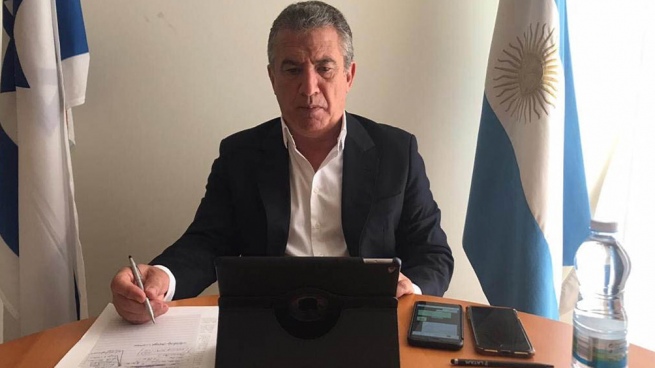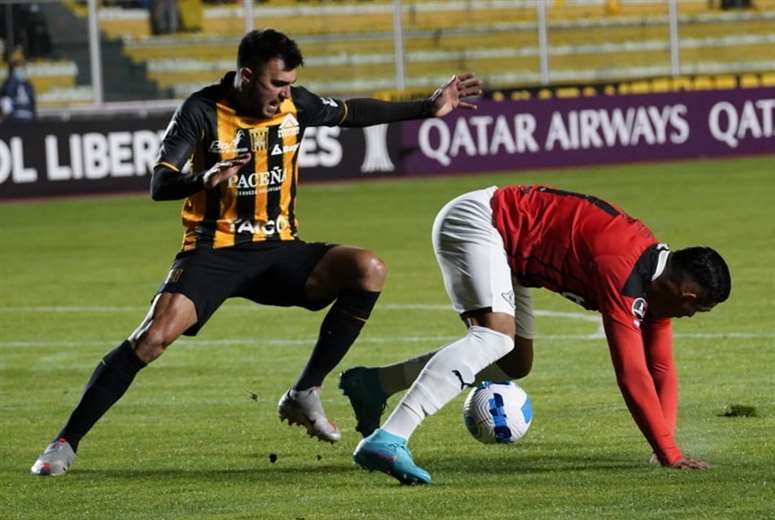President Alberto Fernandez accepted this Thursday night the resignation of the ambassador to Israel Sergio Urribarriofficial sources reported.
Urribarri had made his resignation available after the decision of a Court of Trials and Appeals of Entre Ríos de sentence him to 8 years in prison and lifelong disqualification in an oral and public trial for the diversion of public funds between 2010 and 2015.
Urribarri, also a former governor of the province of Entre Ríos, expressed from his social networks that the ruling of the first instance this Thursday is a “clear display of arbitrariness, injustice and violation of the rule of law”for which he anticipated that he will appeal with the “conviction that I am right,” he said.
The judges Jose Maria Chemez, Carolina Castagno and Elvio Garzon They considered that “with full knowledge” provincial funds were “seized” for a “purely private interest”, in reference to a “campaign to position the image of Urribarri as a candidate for president” in the 2015 elections.
Today’s first instance ruling is a clear example of arbitrariness, injustice and violation of the rule of law. I am going to appeal with the conviction that I am right. However, I have made my resignation as ambassador available to the president.
– Sergio Urribarri (@SergioUrribarri) April 8, 2022
They also indicated in their ruling that there were “returns” by the hired businessmen.
The hearing of more than 12 hours took place from 8:30 a.m. in the Assembly Hall of the Superior Court of Justice of Entre Ríos, in Paraná, but Urribarri and his former Minister of Culture and Communication, Pedro Báez, participated virtually.
In addition to Urribarri and Báez, 11 other people were accused, including relatives, businessmen and former officials of their management.
Since last September 27, 2021, more than 70 witnesses and numerous pieces of evidence within five files of three open cases with the accusation of negotiations incompatible with the exercise of the public function, embezzlement and fraud against the public administration.
Although there were three, the prosecutors Patricia Yedro, Francisco Ramírez Montrull and Gonzalo Badano They unified the files because they were all based on the “use of public funds to finance the presidential campaign” of Urribarri in 2015.
The trial was reached “by force of arbitrariness, abuses and violations of constitutional guarantees and with strong media pressure” and without “rationality or objectivity”Sergio Urribarri
Hiring of companies for requested publications, for the installation of a beach inn in Mar del Plata, to broadcast promotional spots for the Mercosur Summit held in Paraná in 2014, and for street advertising and in newspapers and magazines are some of the main cases in which the prosecution investigated alleged diversion of funds.
Prosecutors also considered that it was a “direction of static advertising in favor of companies close to Urribarri”and where the employers accepted the contracts but had to “return part of the money”.
The defense attorneys and the defendants argued that the investigation and the entire trial were a “judicial political persecution”.
“Are you aware, prosecutors, of the suffering you caused with the media ridicule you promoted?” asked Urribarri in the closing arguments, and highlighted the “onslaught of journalists obsessed with me and my family” before and during the trial.
In addition, the former governor assured that proceeded to trial “by force of arbitrariness, abuses and violations of the constitutional guarantees and with strong media pressure” and without “rationality or objectivity”.
The judges decided to sentence 8 years in effective prison for Urribarri plus lifelong absolute disqualification from holding public office and a fine of $180,000 for the crimes of negotiations incompatible with the exercise of the public function, embezzlement and fraud against the public administration.
Pedro Báez, meanwhile, was sentenced to six years and six months in prison, lifelong absolute disqualification and a $90,000 fine for embezzlement in an ideal competition with incompatible negotiations; and the same sentence received Juan Pablo Aguilera, official of the provincial Senate.
Meanwhile, three years in prison and a $90,000 fine was sentenced for Gustavo Tamay, a provincial employee; Gerardo Caruso, businessman; and Corina Cargnel, accountant of one of the companies.
Although the prosecution had requested 8 years in prison for Cargnel, the judges took into account that “she managed everything, but she did her job as an accountant and was not a civil servant.”
In turn, Emiliano Giacopuzzi received a conditional two-year prison sentence, as did Luciana Almada; while businessman Germán Buffa was sentenced to one year and two months in prison.
On the other hand, Maximiliano Cena, Alejandro Almada -both considered figureheads-, Hugo Céspedes -who died during the trial-, Gustavo Tórtul, and former provincial Tourism Minister Hugo Marsó, were acquitted.
They also ordered the confiscation of two houses located in the capital of Entre Ríos, a motorcycle and two cars.








